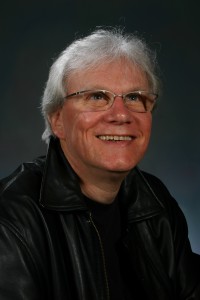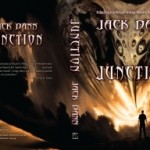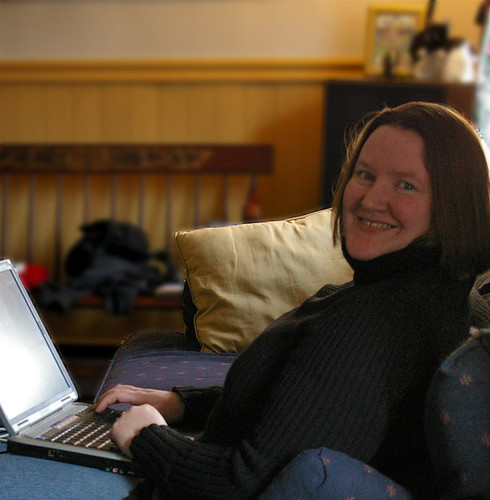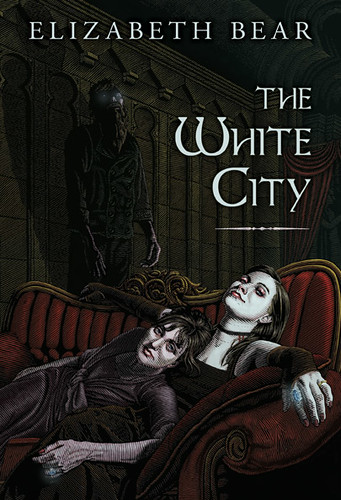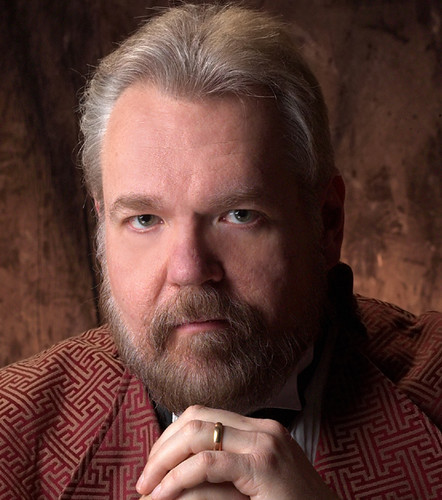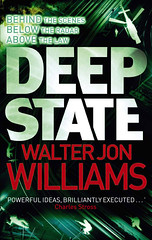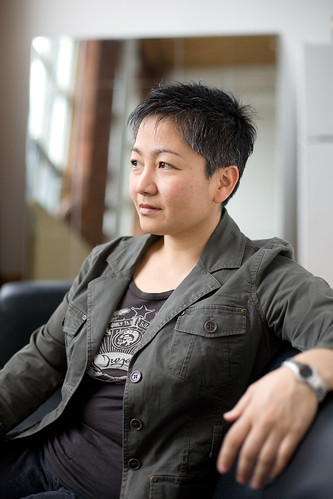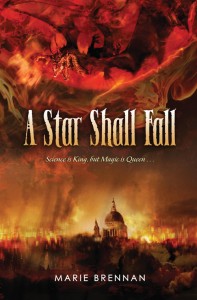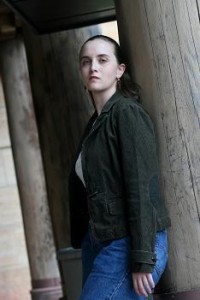Those of you who know I’m a history nerd could probably have guessed that I’d approach Jack Dann for an interview sooner or later: he’s the guy, after all, who wrote The Memory Cathedral – A Secret History of Leonardo Da Vinci! Not only has he won the Nebula, the Aurealis Award, and The World Fantasy Award, he holds the title of Esteemed Knight in the Mark Twain Society.
Jack has been candid and funny and very revealing in this interview about his writing career, and I don’t want to keep you from him a second longer than necessary. So enjoy!
I’m a New York expat living in Australia. I sort of shuffle between our apartment in Melbourne and a small farm in a beautiful part of the country called South Gippsland. It overlooks the sea and a dragon-shaped landmass (and a national park) called Wilson’s Promontory. I live with my wife Janeen Webb, who is an internationally recognized critic, award-winning writer, and a retired university professor. I’ve been writing since the late sixties, and have written or edited over seventy-five books and a bunch of short stories. I’ve won a handful of awards…ach! This is boring stuff!
New and usually young writers tend to put all sorts of dashing things in their bios such as wrestling alligators in Florida and being soldiers of fortune in Algeria. They write that that they train Lipizzaner horses and have pedigreed Manx and Siamese cats that only meow in iambic pentameter. I thought it might be fun to reminisce about the mad old days, so here is some stuff I absolutely and positively would never put into my book bios:
I was…a door-to-door cable television salesman, lifeguard, law investigator, and a law school drop-out. I sold all my text books and became “a freelance writer” the day after Damon Knight accepted one of my stories for his Orbit anthology series. I’ve been a ghostwriter, soup distributor, and a carnival roustabout (that means I cleaned up elephant poo); and I’ve have had my share of nuts sending me death threats, mandalas, and Polaroid photos of their naked selves after they’d read my books. (And here I thought all along that I was writing light, frothy Runyonesque escapist fiction for sophisticates.)
I lived in a hotel in New York City immortalized by Donald E. Westlake—I remember that the doorman wore a tee-shirt and carried a baseball bat. I’ve had two advertising agencies, sat on the board of directors of a New York insurance company, failed at getting a job as a cab driver, worked with the late, great film director Nicholas Ray, and was one of the (God-forgive-me) pioneers in the early days of telemarketing. I was, for a while, the bull-moose loser of Nebula Awards. (Yes, I did win one!) I’ve been a marksman, window-washer, and a lousy jazz pianist. I can’t sing a note and I’ve always had cats as pets…only now we have a dog, a beagle called Bertie Beagleman, who does not respond to commands unless there is food involved: so I suppose I still have a cat of sorts.
Now that’s the kind of bio I don’t write anymore. (Here’s an official bio, from his site, if you want to compare.)
The project of the moment, the project I’m taking a break from to have some fun with this interview, is a book—or rather a series of books—that I swore I’d never write. I’m working on a—I guess one could call it a—fat fantasy series. Although I love fantasy, am a Tolkien reader and re-reader, and love the genre, I really don’t have time for the copycat run of fantasy novels, the badly reupholstered Tolkien knock-offs. I admire (and envy!) the brilliantly original fantasists such as George R. R. Martin, Mary Stewart, R. A. MacAvoy, Ursula K. LeGuin, and Phillip Pullman, but I figured that the big, cosmic, multi-book fantasy genre was just not for me.
Alas, that was a very bad thing for this writer to reveal to his very nasty, noncompliant, and treacherous unconscious. After bragging loudly that I would never ever write such a thing, I just couldn’t stop thinking about it. I didn’t look for ideas…they seemed to be landing all over me like sand-flies in summer.
This fantasy series is set in an alternate Renaissance universe and our universe… and characters can also come from different time periods, which they do! But it is a fantasy, as it assumes the Gnostic Gospels are real, and a number of the characters are angels and demons. Gabriel, for instance, is one of the protagonists.
I have multiple books on the go… I’ve just finished an anthology with Nick Givers entitled Ghosts by Gaslight; am copyediting a Borgo double, which will include my short novels The Economy of Light and Jubilee; compiling three new anthologies to take to publishers; writing the first book of the fantasy series—the book is tentatively titled Shadows in the Stone; doing preliminary work on a book about writing fiction; working with my bibliographer on a second edition of The Work of Jack Dann; some film stuff (no, I can’t discuss any of that yet); and…I think I’ll stop now. It’s hurting my head!
I started writing fiction with the aim of getting published around 1966, and sold my first story (with George Zebrowski) to a magazine called Anubis, which promptly went bust. (We later sold it to a hardcover anthology.) We went on to sell another collaboration to Worlds of If, which was the sister magazine to Galaxy; and that story, “Traps” was published in 1974. So I was in my late twenties. Influences? I’ll try not to bore the reader, but they include F. Scott Fitzgerald, Loren Eisley, J.G. Ballard, Thomas N. Disch, Philip K. Dick, Elizabeth Bowen, J.D. Salinger, Edgar Pangborn, Jerzy Kosinsky, Bradbury, Brian Aldiss, Marquez, Lem, Wells, Gene Wolfe, R. A. Lafferty, Stapledon, Huismans, Mark Twain, John Fowles. I could (but mercifully won’t) go on and on. But if I had to choose just two early influences, it would be Joyce’s A Portrait of the Artist as a Young Man and Salinger’s The Catcher in the Rye
.
I do remember a specific moment when I decided to be a writer. I was in a terminal ward, as they didn’t expect me to survive, and I had a copy of Hemingway’s Down and Out in Paris on my bed table. I was too ill with peritonitis to read, but it became a sort of talisman as I swung back and forth between agonizing pain and the numbing, cold blue dreams induced by Demerol. I promised myself that if I survived, I was going to what I wanted to do: Write. That was over forty-five years ago.
(To get an idea of what I experienced, read my story “Camps”.)
I’m a writer, but that’s only a part of what I am. Sure, I could quit, but I don’t want to. It’s the best life I can imagine. I’ve spent a lifetime following my bliss, as Joseph Campbell would say, so I can’t complain. I’ve done other things—door to door salesman, principal partner in two advertising agencies, director of a New York insurance company—but I’ve always written, no matter what. That’s what I do, and, okay, I suppose in my secret heart of hearts (alas, no longer secret!), I am a writer, then everything else.
I began writing SF and fantasy, I grew up reading SF and fantasy, and although I write ‘across genres’, I keep going back to SF and fantasy, two genres I love. I write historical and contemporary novels…I write what interests me at the time, and right now, I’m doing what I swore I’d never do: that fat fantasy trilogy. Go figure!
I don’t believe in the idea of writer as ‘artiste’. When I had a family, and a six book deal went down the tubes, I became a door-to-door salesman, although I’d never sold a thing in my life. A cable salesman came to the door of my newly mortgaged house, and I made a deal with him: If he’d bring me into the cable company, I’d give him writing lessons. I took care of my family, and when I was making enough money writing, I became a full-time writer.
Every writer has to find his or her own path, and it’s always frustrating and difficult to balance art and craft and life. I tell young writers not to quit their day jobs. I tell them to get up early and write, to give yourself that time so the rest of the day can be given generously to all the other tasks of being a person living in the world. I believe that writers need experience…so learn things, take chances, get the best education possible, become streetwise, and don’t let anything get in the way of your writing. By that I mean, don’t make excuses. If you teach in a university, that’s great. But don’t allow that to become a substitute for sitting down to write. I edit anthologies because I love the process of finding new writers and wonderful work: It feels like writing, and gets me through the difficult stretches. But I keep writing, even if it means bumping up against one dead-end after another.
Frankly, those who really want to write will do so…and the rest will just make excuses…legitimate and rational excuses, but excuses just the same.
Oh, and lastly, I’m not good at balancing my life and my writing. I screw it up all the time. But I write!
You know what the real problem is? I need a few more lifetimes. I’m not a fast writer, and there are so many projects I have in mind. Right now I’m writing the fantasy based on the Gnostic Gospels. If I can stay alive and compos mentis long enough, there are dozens of novels I’d like to write.
I was lucky, as I began selling fiction immediately. I think that was a question of being in the right places at the right times. As I said, everyone’s path is different. I taught myself how to write by writing short stories…and the short stories kept getting longer and longer until I found myself just warming up around the hundred thousand word mark. Yes, there were big sacrifices, but I didn’t notice them until later. It’s romantic when you’re young to be living out there on the edge, not knowing where the next dollar might be coming from; but doing the hustle becomes more difficult as the years weigh down and the midriff bulges. I’ve spent my life living at two hundred miles an hour…with almost no regrets. (I used to say ‘no regrets’, but I’ve discovered you can’t really be alive and not have regrets.
I didn’t go to Clarion, although I’m a big fan and have been a tutor twice at Clarion South in Australia. But workshops were very important to my early growth as a writer. I was one of the original members of the Guilford Writers Workshop and later the Philford Writers Workshop. I wrote about that time in my collection of collaborative fiction entitled The Fiction Factory. Here’s a relevant bit from the book:
Gardner (Dozois) brought me into the Guilford Writers Workshop, which used to meet in Jack C. Haldeman II’s decaying four-story Victorian mansion in the Guilford section of Baltimore; and I became a regular member of the group called the Guilford Gafia (nicknamed after “The Milford Mafia,” which was what some people were calling Damon Knight’s and Kate Wilhelm’s now legendary Milford Writers Conferences). Our group comprised Jack and his brother Joe W. Haldeman, George Alec Effinger, Gardner, Ted White, Tom Monteleone, Robert Thurston, William Nabors, and myself.
Guilfords would last a weekend, a weekend of concentrated, exhausting work: staying up most of the night reading the stories to be workshopped the next day, then workshopping, reading, eating together, partying; we were creating our group mythology, creating fast friendships, as we honed our critical and writing skills. It was the Guilfords, and later the Philford Writers Workshops that paved the way for the frenetic, prolific, never-to-be-repeated Fiction Factory days of the eighties.
The Philfords included writers such as David Hartwell, Samuel R. Delany, John Ford, James Patrick Kelly, Timonthy Sullivan, Tony Sarowitz, Greg Frost, and Tom Purdom. And the “Fiction Factory” days that followed was the time I honed my short story skills and collaborated on short fiction with Gardner Dozois, Michael Swanwick, and Susan Casper. We were selling to the slicks such as Playboy, Penthouse, Omni, Oui, and actually making reasonable money for short stories. So, yes, workshops for me were an education. But many writers do not do well in a workshop environment. Depends on the writer. We all approach writing differently, reach our literary goals by weird and wonderfully circuitous ways, so what worked for me might be anathema for you.
I do remember a moment of artistic breakthrough…in fact, I remember a few. One will suffice. (Yes, gentle reader, you can breathe easier now.) I was writing my second novel, Junction, and I just could not find the right ending. I was thoroughly, completely, unreservedly blocked, so I read anything that felt somehow relevant to what I was working on; I chewed my fingernails, went to movies, took long walks; and finally was about to give it up and start another project. I remember taking a nap in the afternoon. I had pulled the drapes across the windows, yet I had not turned off the bare light bulb that hung over the bed. I remember being jolted awake by an explosion of light. Nothing miraculous had happened. The light was still on. I was staring up at it. But in that instant I saw the end of the novel, scene-by-scene in absolutely perfect detail. It only remained for me to write it down. Go figure.
I don’t know if that’s what you were asking. It’s probably not a breakthrough in the sense you meant it, but what the hell, it’s what came to mind. Ask me about Harlan Ellison and public speaking in another interview: now that was a breakthrough!
I think the big surprise was that publishers would buy my novels. I always had the sneaking suspicion that I was fooling them, getting another one past them…and other writers tell me that they feel the same way. We’re really all phonies, you know. Once the publishers realize that, the jig is up for all of us. The bad surprises? Ah, rejection…but then, as we all know, that really isn’t a surprise.
It still feels great. Which definitely proves that there must be something seriously wrong with me.
